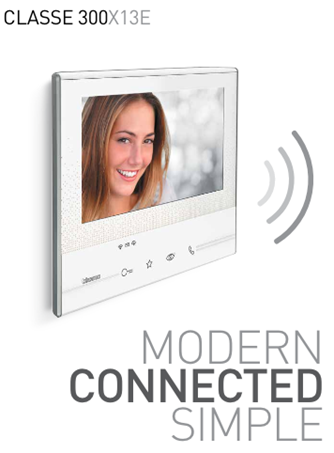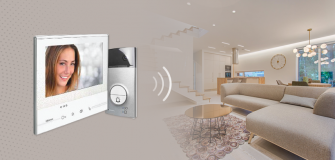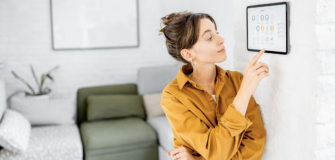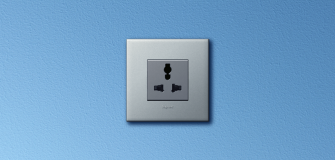Your Complete Guide to Home Automation: Setting up a Smart Home in 2023
Your Complete Guide to Home Automation: Setting up a Smart Home in 2023
Did you know? The Indian home automation market size was valued at $1,790.9 million in 2018, and is expected to reach at $13,574.1 million by 2026, growing at a CAGR of 29.8% during the forecast period 2019-2026. Source
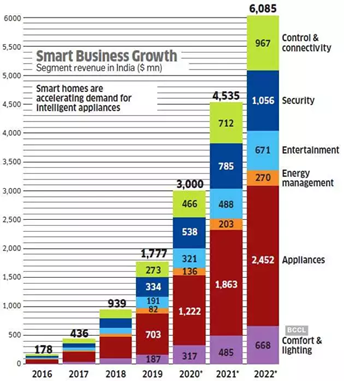
Source: The Economic Times
Automation; a word that’s all too familiar for anyone living in the 21st century.
Building automation is an upcoming trend in today’s marketplace.
The self-sufficiency of various functions and sectors has allowed homeowners and businesses to increase efficiency and track the usage patterns of enclosed spaces.
In this day and age, the possibilities are limitless. Home automation has expanded, from residential and commercial to retail and hospitality sectors.
Still, for most, setting up a fully automated smart home can seem like a daunting task.
How do you get started?
How expensive is it?
Is smart home automation even worth it?
In this extensive smart home guide, we answer these and many more questions on how you can transform your home into an intelligent one.
Home Automation & Smart Home Basics
What Is a Smart Home?
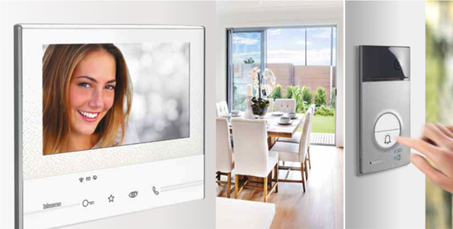
Source: Legrand
In simple terms, a smart home consists of devices, systems and appliances connected to the internet. These devices can be controlled remotely via a smartphone, tablet or laptop.
For example, sending a voice command to a smart speaker like Amazon Alexa to switch on your light bulbs is just one aspect of a smart home.
Typically, a comprehensive smart home has an intelligent climate system or a home security system, plus two additional smart devices.
But, unless you’re planning to sell, your smart home can be as simple as a few smart devices connected to Wi-Fi or as integrated as a whole-house system that automates several menial tasks in your home.
What Is Home Automation?
For the longest time, “home automation” was used as a blanket term to describe any device that could eliminate the repetitive nature of household tasks.
Simply put, home automation makes living easy.
Due to recent developments, a more holistic definition has come forth:
According to smart home experts, “Home automation is the fusing together of next-generation hardware and software solutions to provide users with full control and flexibility to manage every aspect of their home in a way that best suits them”.
On a higher level, true smart home automation refers to the seamless integration of all things – connected, smart and self-operating devices that put total control of the entire home environment at the user’s fingertips.
This is referred to as “thoughtful” home automation and is the ultimate dream solution. For “thoughtful” home automation that works the way you want it to, custom installation is the only option. While off-the-shelf solutions offer pre-set options, custom installations allow homeowners to choose precisely which smart technologies they would like to install.
What Are the Benefits of a Smart Home? / Why Are People in India Switching to Home Automation?
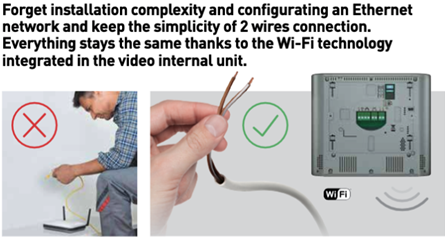
Smart home automation allows users to tap into high-tech functionality and luxury that wasn’t possible in the past. As technology development continues to expand, so will the possibilities for consumer home automation to make life easier and more enjoyable.
If you ever decide to upgrade your lifestyle & invest in smart devices, here are a few benefits you can expect:
- Automation & Convenience: Specific tasks can be triggered to occur routinely such as switching on lights, vacuuming the floor, setting the desired room temperature or preheating the oven.
- Energy Saving: A smart home ensures utilities like water and electricity are used more efficiently. For example, a smart thermostat only warms your home when it senses there are people around. Similarly, smart lights only turn on when they sense user motion.
- Better Home Security: A smart security system offers better home security. For example, smart wireless cameras allow users to monitor their home from anywhere. Motion sensors, automated lights and smart doorbells also offer higher security standards and fewer chances of break-ins.
- High Resale Value: In case you’re contemplating flipping your home sometime in the future, adding smart devices (especially security and climate control) can significantly increase its value and ensure a better lifestyle.
What Are Some Popular Examples of Smart Home Devices?
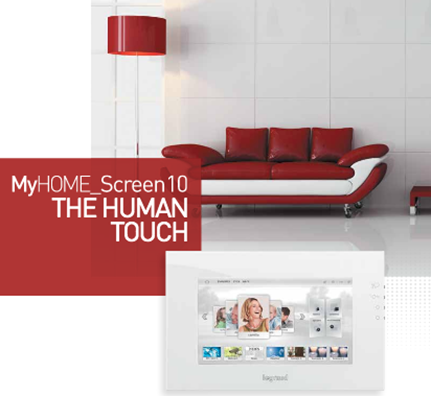
Given below are various examples of automated devices at home:
- Window blinds that can be opened or closed at the push of a button, or when internal temperatures reach a certain point
- Concealed drop-down televisions that can swivel to preset positions and then move out of the way when not needed
- Intelligent lighting control systems which ensure energy efficiency
- CCTV cameras, smart switches and intelligent entertainment systems
The actual technology installed varies from home to home and is dependent on individual needs.
For some, these needs may be as simple as a smart thermostat to reduce electricity usage at home. For others, it might mean an integrated whole-home multi-media solution.
Legrand allows every user to upgrade their home exactly as they please. Thanks to our holistic range of wiring and home automation systems, turning a home into an intelligent one has never been easier.
From a stand-alone solution to a fully networked home system, the complete spectrum of functions for every desired application can be covered within a single design, making sure you don’t have to compromise either on technical or on aesthetic criteria.
Our comprehensive brochure has all the details: Legrand Home Automation – Brochure
Getting Started With Home Automation
How Do I Get Started With My Smart Home?
Look around your house and consider all the inconveniences and annoyances you’d like to automate.
If vacuuming the floor is time-consuming, it’s time to add a smart vacuum to your wishlist.
If adjusting the temperature of a thermostat is a chore, consider switching to a smart one. This will definitely make your home more comfortable while ensuring energy saving and efficiency.
If you live in an area where burglars are rampant, or have several visitors day in and day out, a smart security system or video door phone should be your priority.
With the Legrand Classe 300, users can control access to their homes, on-site or remotely, via their smartphone, tablet or car. This video door entry system is part of our interoperability strategy and is compatible with voice assistants like Siri, Amazon Alexa and Google Home; enabling users to enjoy the benefits of comfort and security.
In the end, there’s no official guide to setting up a smart home. The way you want to go about it depends on your needs and situation.
What Are the Ideal Smart Home Devices to Get Started With?
As stated earlier, the ideal smart home devices for you depends on your needs. But, just in case you’re unsure about what you need to embark on your home automation journey, here is a list of the most common smart home devices you can start with:
- Smart Lighting: By adding a few smart switches to your home, you’ll be able to control them remotely using an app on your phone or through voice command. You can also set them to switch on and off at a particular time. (e.g. when there’s movement in your house, when you’re on your way home or when the sun sets).
- Smart Thermostat: A smart thermostat can help you automate your home’s climate control and set the ideal temperature depending on the time of day and weather forecast.
- Smart Security: A smart security system usually includes an array of smart devices, including a smart camera, smart outdoor lighting, motion sensors, video doorbells and smart locks.
- Smart Entertainment: This consists of smart TVs, smart music systems and smart speakers.
Nuvo is an award-winning product line of Legrand which specialises in advanced whole-home audio systems, smart speakers and solutions that deliver a truly unparalleled listening experience. Using a specific free smartphone app and tablet; it is possible to access music playlists in local networks and the best online music streaming services.
- Smart Home Hub: A smart home hub allows users to control multiple devices. The most popular smart home hubs include voice-controlled smart speakers such as Amazon Echo and Google Home.
What Wiring Do I Require for a Smart Home?
Modern smart home systems are usually wire-free. Most smart home devices are ready to be used, as long as you have a router and a smartphone.
But, in some cases, specific smart devices require wiring for power to communicate with non-smart systems such as air conditioning, TVs or sprinkler systems. Smart devices that require a certain degree of wiring include smart thermostats, smart light switches, smoke alarms and smart doorbells.
Luckily, with Legrand, installation and set-up of smart home devices is hassle-free and painless. Get in touch with us to know more: <email id>
Do I Have to Automate My Home From Top to Bottom?
No, to convert your home into a smart one, you can start with certain aspects only.
Most users worry about cost the most, so they opt to do it piece by piece, or device by device.
First, identify your needs. What do you need a smart device for?
- If it’s security, start with smart security devices
- If it’s for convenience, opt for smart switches and smart lighting
- If it’s for entertainment, go for a home sound system
In case you’d prefer to upgrade your entire home and reap the benefits of smart home automation in one go, then it’s best to look for a reliable home automation company, like Legrand, to do it for you.
Looking for a user-friendly, cost-effective entry point into home automation and IoT? Why not consider investing in our connected devices program – Eliot? Millions of users are experiencing a connected life every day, and you can too!
How Do I Know Which Devices Are Compatible?
To know if home automation systems or devices are compatible with automation hubs; manufacturer specifications can be checked on the product label.
For instance, if you own an Amazon Echo, look for smart products that are compatible and can be controlled with Amazon Alexa. Similarly, if you own a Google Home Speaker, look for products that are compatible with Google Assistant.
At Legrand, our products are compatible with an array of devices. To know more, check out our compatibility chart below:
Is Home Automation Expensive?
Contrary to popular belief that all smart homes are expensive, in reality, they are as costly as you want them to be. For example, if a person is looking for a custom-built design with only connected devices, then the cost would undoubtedly be a little steeper than expected.
However, upgrading step by step will cause the value to vary. So if you are starting out and are looking to step into the world of home automation, then purchasing a smart switch from Legrand would be an ideal starting point.
Arteor Smart Switches are a new way to connect your home. These switches can be controlled via a smartphone, tablet or voice control and allow you to manage individual lights, curtains, electrical appliances and more, improving user experience and providing comfort every day.
From here on out, simply install additional devices as and when it fits your budget. When it comes to the installation process, home automation products with sleek and flexible designs are effortless and can be integrated with your home quickly and efficiently.
How Much Does Home Automation Cost?
This entirely depends on how far you want to go.
You can spend a small amount on home automation hub starter kits or a more considerable amount for complete home automation.
Most people prefer taking it slow and buying individual smart devices as and when they need them. It’s usually more reasonable that way, and you can choose a pace that fits your budget.
But complete home automation is not always costly.
The advantage of this is that you don’t have to keep buying individual devices and worrying about compatibility.
But do keep in mind, sometimes, complete home automation services could have a monthly maintenance fee, so this should be included in the budget.
Will Home Automation Add Value to My Home?
Source: Legrand – India Mart
Yes, home automation increases the value of your home.
Smart homes attract a larger number of buyers who are willing to pay more for smart features.
Make sure to install the most useful kind of automation. Smart security and climate control systems are currently the most popular among potential buyers. Adding smart entertainment systems and other smart gadgets can also help make homes more attractive.
Is a Smart Home Expensive to Maintain?
A standard smart home doesn’t have any maintenance fees. Additionally, most smart devices don’t have a subscription cost, and you don’t have to pay an organisation to maintain them.
However, some smart systems, such as security, may require a monthly payment. Additionally, you might have to pay ongoing costs if you opted for professional whole-home automation.
Will a Smart Home Save Me Money?
Yes, some smart devices, such as smart thermostats and smart lights, can save you money by reducing your energy consumption.
Home Automation is the Future
To live the advantage, we, at Legrand, believe that continuous upgradation is crucial. We constantly anticipate our customers’ needs with technologically advanced products and have, therefore developed a range of wired and wireless home automation solutions that are entirely customisable and match the most demanding aesthetic standards.
We hope our guide will help you take your first steps towards smart home automation.
Feel free to browse through an array of such products on our website, readily available for purchase: Modular Switches | Home Automation | Video Door Phone | IoT Devices
